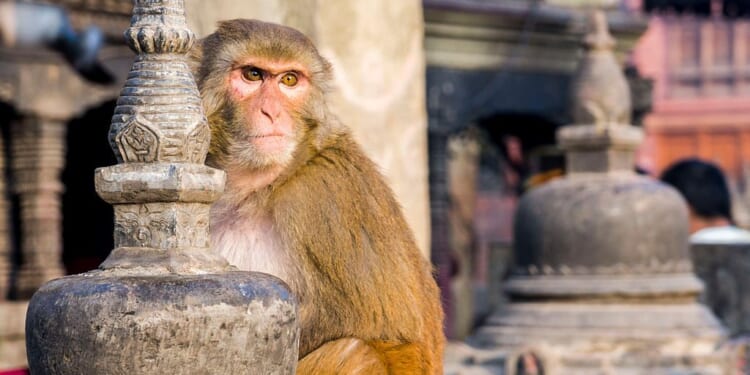Ever since the ancient Greeks, we’ve thought of human beings as distinctly rational. For Aristotle, what set us apart from the other animals was the capacity for reasoning and speech. The moderns took up this line of thinking with renewed vigor, even as they narrowed reason’s scope to refer only to scientific rationality.
But that definition of humans isn’t quite right, said Alexander Schmemann.
A 20th-century Orthodox Christian theologian, Schmemann coined an alternative name for our species, Homo adorans, claiming that worship is at the center of what it means to be human, not thinking. “The first and basic definition of man is that he is the priest,” Schmemann asserted without a hint of embarrassment. “He stands at the center of the world and unifies it in his act of blessing God, of both receiving the world from God and offering it to God.”
I thought of Schmemann a few months ago while reading an essay by the Catholic writer R. R. Reno. “We are hardwired to worship,” writes Reno, using a term — “hardwired” — that is more common to the realm of evolutionary psychology. “If we turn away from the true God,” Reno continues, “we will chase after false gods.”
Reno and Schmemann are both devout believers, so it’s easy to dismiss their claims as propaganda. They want us to believe that worshipping is natural and necessary, just as they do. But is there some remote chance that they could be onto something? Could there be an evolutionary explanation for this common human act of worship? Is it grounded in an animal instinct?
I’ve come to believe that it is. We have to try to understand worship as a biological phenomenon.
The first clue comes from the field of animal behavior, where it pays to be a bit of a prankster. Often, the goal of the researcher is to “trick” the animal and thereby reveal how it goes about its business. We all know that birds fly south for the winter, for example. But how do they do it? How do they know which direction to fly?
Scientists in the 1970s had a hunch that the birds were looking for cues in the night sky. To test their hypothesis, these clever researchers decided to raise a flock of indigo buntings inside a planetarium. By tweaking the settings on the projector, they could create a false sky for the birds. The poor buntings, raised in the avian equivalent of Plato’s cave, would then try to fly north for the winter. Or east. Or west.
It turned out that the key variable was the sky’s rotation. Normally, in the Northern Hemisphere, the sky seems to rotate around Polaris, the outermost star in the Little Dipper’s handle. This is why we call it the North Star — because it’s always in the north. But the scientists created their own version of the heavenly sphere, in which everything rotated around, say, the star Betelgeuse. The birds inferred, incorrectly, that north was way over there and flew in the wrong direction as winter approached.
I first learned about the ingenious planetarium experiment a couple decades ago when I took a course in “comparative psychobiology” at the University of California, Los Angeles. Ants, we learned, use geometry to plot their way home if you put an obstacle in their way. Barn owls, if you plug one of their ears, aren’t able to locate their prey in space and will strike at the wrong spot. Catsharks can be induced to attack an empty patch of sand if you embed electrodes in the sand that mimic the electrical field produced by the shark’s prey, a flatfish that buries itself to hide.
Our professor, the cognitive neuroscientist Randy Gallistel, had a particular goal of disabusing us of our naive notions about the nature-versus-nurture debate. Nature and nurture are all bound up with each other, he claimed: “your genes create your environment.”
What? I remember my puzzlement at this statement. Your genes create your environment. What could he possibly mean by that? Your environment, by definition, is everything that happens to you after your genes miraculously cohere at the moment of conception, I thought. Your genes have no control over it.
But that’s not so, Professor Gallistel argued. Your genes control what aspects of the environment you pay attention to. Our confused buntings, for example, are genetically programmed to pay attention to the stars in the night sky. Their genes “know” that the birds need a sense of direction to avoid dying of cold or hunger during the hard winter months. Because of this, the sky’s rotation is a part of the bird’s environment. Other animals are completely oblivious to this phenomenon, presumably because it isn’t relevant to any of their behavioral choices.
At the most basic level, our genes even determine what we perceive. Human beings can see all the colors of the rainbow, but we are blind to ultraviolet and infrared light. These colors exist in the natural world, but they aren’t a part of man’s visual environment. It is our genes that make it so, as they contain the instructions that tell our body how to make our eyes. Apparently, our genes “believe” that awareness of UV and infrared light isn’t necessary for a human to survive and reproduce.
If we are to consider worship as a biological phenomenon, we need to ask ourselves: what kind of organism is a human being? What does man pay attention to and why? And what are we trying to bring about for ourselves when we engage in the act of worship?
“Worship, not thinking, is at the center of what it means to be human.”
In the brutally violent climax of the movie Apocalypse Now, the murder of Colonel Kurtz (played by Marlon Brando) is intercut with the ritual sacrifice of a water buffalo by the natives. And this was no product of movie magic: Francis Ford Coppola and his crew captured a real religious ritual of the Ifugao people of the Philippines, who had been hired to play the Vietnamese natives in the movie. In the scene, the bull is viciously hacked to death by three native men carrying large machetes, and the animal is nearly decapitated.
“The horror,” whispers Kurtz as he dies.
Perhaps the hardest thing to explain about the act of human worship is how destructive and violent it can be. It is indeed often horrific. The ritual killing of animals has recurred again and again across the world and throughout human history. Often, the body of the animal — or some portion of it — is burned or destroyed, rather than being consumed by the worshippers.
Studying the native peoples of America and Northeast Asia, the French anthropologist Marcel Mauss noticed that their tribes, unrelated and often so distant from one another, shared a common system of ritual trade and worship that he called potlatch. At its center was the willful destruction of one’s own property.
“All the forms of potlatch in the American Northwest and Northeast Asia,” wrote Mauss, “know this theme of destruction … precious oils [are] burnt, copper objects [are] cast into the sea, and even the houses of princes [are] set on fire.” This is all baffling from an evolutionary perspective: why would a creature destroy its own food or shelter?
But if we are going to understand and explain human worship as a biological phenomenon, we will have to contend with an even more extreme and horrifying example of this destruction: human sacrifice, child sacrifice.
It is a discomfiting fact that the ritualistic sacrifice of children appears again and again in the historical and archaeological record. Corpses of murdered Incan children have been discovered on the mountaintops of Peru. The early Roman and Hebrew sources contain numerous accounts of child sacrifice in the ancient Middle East. In 2012, the remains of 80 teenage girls were unearthed under the wall of a fortress in what is now the Shaanxi province of China. And the phenomenon is surprisingly persistent, right down to our own time. In the past few years, there have been disturbing cases in Africa and India.
Weirdly, some common forms of modern worship still echo these horrors. Perhaps Coppola was fascinated by the sacrifice of the water buffalo partially because it resonates with the Roman Catholicism of his own upbringing, a religion which puts the torture and ritualistic murder of Jesus Christ at the very center of its liturgy. God, we are told, “sacrificed His only son” for us.
“Man may be fitfully rational, but he is something else besides.”
The persistence of child sacrifice seems to make a mockery of the evolutionary account of human beings. If man’s purpose for living is to reproduce and transmit his genes to the next generation, then the slaughter of one’s own children would seem to be, at the very least, counterproductive.
But it’s equally unkind to other worldviews. In the face of child sacrifice, it’s going to be difficult to hold out a Rousseauean faith in archaic man as the “noble savage” who was only later corrupted by modern society and civilization. And it certainly gives the lie to the Greek philosophers’ idea that the essence of man is “rationality.” Man may be fitfully rational, but he is something else besides.
Perhaps it suggests that man has no essence or nature at all beyond some basic biological urges. Perhaps human culture is completely malleable and arbitrary. Maybe the social engineers, the utopians of both the Right and the Left, are right, after all.
But I don’t think so. It was a couple of Freudian psychologists, and a colonial-era anthropologist, who helped me understand what’s going on in child sacrifice. Ernest Becker won the 1973 Pulitzer Prize for his book The Denial of Death, which argues that human beings embed themselves in religion and culture — the world of symbols — in order to escape or deny our inevitable death and decay.
But it is a later book by Becker, the more speculative Escape From Evil, published in 1975, that addresses directly this question of sacrifice, destruction, and worship. In it, the author argued that worship is man’s response to an existential dilemma. “Man,” he wrote, “has always casually sacrificed life for more life.”
Mauss, the anthropologist, said something similar when he attributed to archaic man “the belief that he has to buy from the gods and that the gods know how to repay the price.” And Norman O. Brown, another Freudian who influenced Becker, put it even more bluntly in his 1959 book, Life Agaist Death: The Psychoanalytical Meaning of History: “In the archaic consciousness, the sense of indebtedness exists together with the illusion that the debt is payable; the gods exist to make the debt payable.”
Becker, Brown, and Mauss believed that we offer the gods life so that they might give it back to us. Their underlying assumption was that we human beings experience life as a gift, whether we like it or not. Whether we admit it or not. And we feel a compulsion to repay the gift. “The original sacrifice is always food,” Becker taught, “because this is what one wants from the gods as the basis for life.”
This is an ancient idea that recurs again and again in archaic societies. In Hinduism, for example, the sacred scriptures of the Satapatha Brahmana claim that every man is “born as a debt to the gods.” One makes sacrifices to the gods “because of a debt owing to the gods from birth.”
If Becker and Brown were right, then human sacrifice — child sacrifice — is a case of reciprocation gone wrong. It springs from a mistaken belief that we can enter into a trading relationship with the gods and thereby gain some control over our destiny. According to the anthropologist H.M. Hocart, “the ritual aims at abolishing the uncertainty.”In the grips of this theological error, we sacrifice our food, because we want more food. We sacrifice our shelter, because we want shelter. We sacrifice a life, because we want more life.
But maybe this all sounds like psychobabble. Perhaps the urge to reciprocate with the gods is just another pseudo-Freudian notion about the ultimate hopelessness of the human psyche. It’s not psychobabble, though. We have very good scientific reasons to believe that man is the animal with a hyperactive attention to gifts. Just ask the evolutionary psychologists. Pay attention, they will tell us, at food sharing in the vampire bats.
The field of evolutionary psychology may have been born in 1971. It was in that year that a young graduate student named Robert Trivers published a now-famous paper laying out a theory called reciprocal altruism. It was, among other things, an evolutionary explanation for the emotions of gratitude and sympathy. “I suggest,” Trivers wrote, “that the emotion of gratitude has been selected to regulate human response to altruistic acts and … that the emotion of sympathy has been selected to motivate altruistic behavior as a function of the plight of the recipient of such behavior.”
Trivers used the dry, tactical language of evolutionary theory (and the math of genetics) to explain how and why humans commit selfless acts for those unrelated to us. His most surprising claim? That the emotions of gratitude and sympathy pay dividends for the human organism in its effort to survive and reproduce.
In the animal world, the classic example is vampire bats. These blood-sucking creatures can only survive for a couple of days without food, but on any given night, there’s a fairly good chance that the bat will be unable to feed. The bats’ solution to this vulnerability is sharing. A bat who hasn’t fed will “beg” for food from a bat who has, and the satiated bat will regurgitate some of its meal for its “friend.” At a later date, the tables are likely to be turned, and the gift will be reciprocated. It’s a kind of crude insurance.
We can imagine that food sharing was an essential fact of early human life and shaped our evolution as a species. As Professor Gallistel from UCLA might argue, our social environment is created by these hardwired emotions of gratitude and sympathy. Gratitude puts us on high alert for gifts, and it triggers a biological instinct to reciprocate. Sympathy puts us on high alert for the needs of others and triggers an urge to help or to share.
Now, imagine, for a moment, that the vampire bats could talk to each other. What would they discuss? They would probably talk about their food and where they got it. “Hey, those cows that we fed on? Now they’re over by that oak tree.” And they’d talk about each other. “I shared with Charlie last week, but then last night he stiffed me. Can you believe that? I’d stay away from him, if I were you.”
Reciprocity is turbo-charged by language — the ability to speak. For one thing, language opens up whole new vistas of gift-giving. No longer must I regurgitate my food for my friend; I can just tell him where the food is. But language also means that I can trade with many, many other individuals, because who shares — and who doesn’t — quickly becomes public knowledge. If I tell my friend to avoid Cheater Charlie, then I am simultaneously giving a gift to my friend (he can avoid costly interactions with the cheater) and punishing Charlie (who will find it harder to participate in the sharing economy).
For the individual organism, this is a whole new world. If I am generous to one, word quickly gets around, and suddenly everyone seems eager to share with me. But if I am stingy with one, soon everyone seems to be reluctant to share with me when I need it. It starts to feel like I am trading not with isolated individuals, but with the community as a whole. And I start to worry about my reputation: what could they be saying about me when I’m not around? From this evolutionary perspective, it seems likely that gossip is the core function of language (a hypothesis first put forward by the British anthropologist Robin Dunbar). It’s no accident that, in English, we often refer to the act of conversation as “sharing.”
Let’s assume, for a moment, that Trivers is right. Let’s assume that the human animal is designed by evolution to be on the lookout for gifts, for every gift is an invitation into a sharing relationship that may save my life later on. Let’s take it as a given that human beings have a hardwired instinct to reciprocate the gift, an instinct that was amplified by the ability to speak. And now that reciprocating instinct is as strong as the urge to eat or to reproduce. For the sake of argument, let’s imagine that it is the core drive that makes a human being a human being and not, say, an indigo bunting or a catshark or a chimpanzee.
Such a creature cannot help but find itself trapped in an infinite regress of gratitude. After two weeks of near starvation, I’m suddenly gnawing on this extremely delicious leg of wildebeest. I got it from my older sister, who got it from my mom, who got it from my dad, who got it from the chief of my village. The chief got it, in trade, from the chief of that village over there by the lake. And he presumably got it from his village’s best hunter, who got it from nature, as the wildebeest presumably got its life from its mother, who got her life from her mother, and so on into infinity.
“We human beings experience life as a gift, whether we like it or not.”
Modern men and women face a similar conundrum. Every day, I’m told that there are thousands and thousands of people cooperating to put food on my plate. Fishermen in Alaska. Farm laborers in rural Mexico. Ship captains from Europe. Truck drivers on the roads of America. Plus, all the backroom employees of the grocery stores, snack shops, and restaurants that I visit. They’re all somehow serving me, despite the fact that I’ve never met them. Modern life is a never-ending (and terrifying) paradox of plenty. We are trapped in the miracle of the loaves and fishes.
Isn’t it possible that God exists in the vanishing point where our hardwired gratitude disappears into the distance of infinity? Or, if you prefer, we could say this is where the idea of God exists. It would explain why the act of worship is bound up with gratitude and thanks. The etymology of the word “Eucharist” is the Greek word eukharistos, which of course means “gratitude.” It is a ritual, after all, of food sharing.
In his published writings, Trivers never considered the existential implications for a thinking beast that is hardwired to be grateful. If he had, he may have come to similar conclusions as Becker, Brown, and Mauss. “Unlike us,” wrote Becker, “primitives knew the truth of man’s relation to nature: nature gives freely of its bounty to man — this was the miracle for which to be grateful and beholden and give to the gods of nature in return.”
If you’re a nonbeliever, think of it as a glitch. Our biological instincts trick us into seeing life as a gift, even though it’s all just a grand accident. Of course, the believer will counter that human beings are the only animals who have evolved the capacity to recognize that life is a gift. “The unique position of man in the universe,” wrote Schmemann, the theologian, “is that he alone is to bless God for the food and the life he receives from him.”
What’s striking here is that many forms of Christian worship — including the Catholic Mass — bear a formal resemblance to the archaic sacrifice ritual, but they are bloodless. And instead of trying to barter with the gods to abolish uncertainty, biblical faith urges one to submit to uncertainty. “Not my will,” says Jesus in the Garden of Gethsemane, “but yours be done.”
Indeed, it’s possible to read the entirety of the Hebrew scriptures, as well as the Christian gospels, as an extended meditation on what it means to be indebted to God and what is the appropriate way to respond. “What shall I render to the Lord for all the things that He hath rendered to me?” asks the Psalmist. Like the pagans before him, Abraham is prepared to murder his son Isaac in an act of sacrifice. But God, at the very last moment, tells him that it isn’t necessary and provides a substitute.
Perhaps one lesson of Jesus Christ’s death and resurrection is this: stop sacrificing your tribal enemies, your fallen kings, your children, and even your goats. There is only one life that is yours to give — your own.
But gratitude isn’t a given, and this is no utopian vision. For if man is the grateful beast, he is also the suspicious beast. “We do not quite forgive a giver,” wrote Ralph Waldo Emerson in a strange little essay titled Gifts. “The hand that feeds us is in some danger of being bitten.”
We share because we are vulnerable, but the act of sharing also makes us vulnerable in new and scary ways. In the evolutionary logic of Trivers, a sharing animal like man will always be wary of being cheated — of offering a gift that isn’t fully reciprocated. But we are just as fearful of being branded as cheaters ourselves or becoming known as stingy. In his studies of archaic cultures, Mauss observed that giving and receiving are always fraught with risk and high emotion. “The gift is something that must be given, that must be received,” he wrote, “and that is, at the same time, dangerous to accept.” Our gratitude may indeed be hardwired, but it is also contingent.
“Reciprocity is turbo-charged by language — the ability to speak.”
We are especially suspicious of the unsolicited gift, because it is an invitation into an ongoing relationship of reciprocity. “To refuse to give, or to fail to invite, is — like refusing to accept — the equivalent of a declaration of war,” observed Mauss. “It is a refusal of friendship and intercourse.”
Of course, the difficulty for us is that, in the primordial burbling of our nervous system, we feel our very existence to be an unsolicited gift. This is what Martin Heidegger was getting at when he called attention to the geworfenheit (the “thrownness”) of human existence — I didn’t ask for this. This existential angst is the flip side of infinite gratitude and indebtedness.
On a more prosaic level, even our daily economic life is fraught with ambivalence. We are trapped in an endless game of calculation, tracking who owes what to whom. “Making prices, assessing values, thinking out equivalents, exchanging,” Friedrich Nietzsche mused, “all this preoccupied the primal thoughts of man to such an extent that in a certain sense it constituted thinking itself.”
The idea that we have an inborn instinct to give and receive gifts, to reciprocate with our fellow human beings, is a kind of key that can help us understand so many different spheres of human life: the social, the moral, the economic, the psychological, the legal, and the religious. But, of course, for early man, there was only one sphere of life, and it encompassed all of these. Sharing and reciprocation held it all together. It was a “total” system, as Mauss called it.
The temptation is to imagine archaic man living in an arcadia of unconflicted relations with his fellow man, and to hope that we might somehow return to that state. The anthropologist David Graeber wrote a fascinating book, Debt: The First 5,000 years, touching on some of these themes. In it, he imagined “that children born today might live to see the day when there is no longer an ‘economy.’’’ He seems to have believed they will be better off than we. Nietzsche, meanwhile, fantasized about a world in which aristocrats and warriors are no longer burdened by a sense of pity or responsibility for those in need. I suppose we all have our Edens.
But if Robert Trivers was right, then suspicion and social anxiety and pangs of sympathy are all features, not bugs, and they are precisely what make us human. They are also the reason why it’s so hard to be at peace with one’s self and the world.
“He is a good man,” wrote Emerson, “who can receive a gift well.”
How does one respond to a gift?
It’s possible to reject a gift outright, of course. Or you can accept it and then later complain about the quality of the gift, as if you deserved more or better. You can deny that it was really a gift at all. Or you can attempt to return it for something else. You can try to repay the gift, so as to be square with the giver. You can try to avoid the giver out of fear that there is no possible way that you could repay it.
Yet another possible response is to accept the gift graciously with joy and wonder. You might attempt to show honor and respect to the giver, especially if the gift cannot be repaid. If the giver is unseen, faceless, you might attempt to bestow upon the giver a name and a face. You might set up a place where you could go and imagine and encounter this unseen giver. You might design certain habits or rituals, and tell certain stories, that would remind you of your gratitude and help you to avoid slipping into ungratefulness or resentment. You might do this with other people who have also received the gift.
Over the last 100 years or even more, I fear that we, like the indigo buntings in the planetarium, have been looking up at a false sky. Perhaps seeking relief from existential anguish, we have been telling ourselves stories that let us off the hook, that promise us respite from the weight of infinite gratitude. We try to convince ourselves that there is only the human will and its eternal fight against the chance and entropy of the material world. In our more delusional moments, we almost come to believe that we are winning that fight. But when we accept those stories, we put our conscious mind at war with the biological instincts of our unconscious mind, which cannot help but wonder at the gift of life.
Perhaps now is the time to step out of the planetarium and stare, without blinking, at the night sky in all of its terrible strangeness and beauty, confronting our own smallness, our inexplicable existence, our utter dependence on each other and on nature. When we do, we may find that the only appropriate response — the fully human response, the biological response — is to bow our heads, get down on our knees, and offer a prayer of praise and thanks.

















